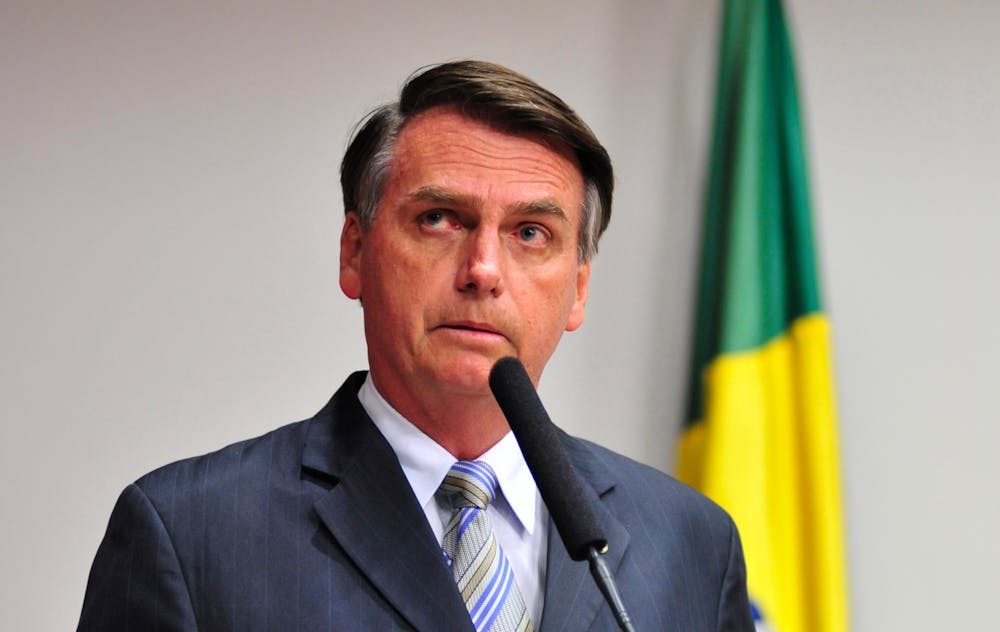Beatriz Rey, a visiting fellow at the Stavros Niarchos Foundation (SNF) Agora Institute and expert on Brazilian politics, gave a pop-up talk about the political effects of the recent presidential election and what the results mean for the future of Brazilian democracy on Nov. 2.
Brazil voted in Luiz Inácio Lula da Silva, also known as Lula, who won the election with 50.9% of the vote. The current president, Jair Bolsonaro, received 49.1% of the vote.
Rey proposed this SNF Agora pop-up event when she realized that the election was going to be a close one. Stephen Ruckman, the SNF Agora deputy director, explained the necessity of hosting the event in the wake of the election results in an interview with The News-Letter.
“Events like this further our mission to educate on issues of global democracy and to remind Hopkins students — and all attendees — that democracy is facing challenges around the world,” he said.
Rey began the talk by explaining why this election was different from every other Brazilian election since 1985.
“This was the first election since [1985] that was unfair,” she said. “President Bolsonaro engaged in a lot of electoral spending against the electoral law.”
Brazil’s electoral law prohibits candidates from spending on social policies at least three months before an election. The purpose of this law is to prevent an incumbent from having an unfair advantage to buy votes for the purpose of getting re-elected. Bolsonaro engaged in this vote buying.
After losing the election, Bolsonaro also supported demonstrators who blocked major highways and airports, demanding that the transfer of power be prevented In one of his speeches, Bolsonaro suggested that he received unfair treatment in the election.
These events reminded Rey of the months after former U.S. President Donald Trump lost the election in 2020, but Rey added that Bolsonaro’s reaction was ultimately calmer than expected.
Freshman Raghav Agrawal, who attended the event to learn more about the Brazilian election after hearing about it from his Brazilian friends, described his takeaways from the talk in an interview with The News-Letter.
“Even though this may seem like a victory for democracy, the fact that the only way an extreme politician was out-voted was by a 77-year-old two-time President [shows] there is clearly something stirring, not only in Brazil but many countries around the world, that very well may affect how we think about democracy,“ he said.
Rey highlighted Bolsonaro’s political isolation in the aftermath of the election. She described how many Brazilian politicians congratulated Lula on his successful campaign, while Bolsonaro displayed fear of prosecution.
“[Bolsonaro is] also looking into some sort of amnesty or a pardon because he's scared, not only being prosecuted for what he did during the pandemic but also [because] his sons are involved in many fake news investigations,“ she said. “There's a lot that could hurt him starting Jan. 1 when he doesn't have the protection of being an elected official.”
Rey expressed worries that Bolsonaro’s supporters might disrupt Lula’s inauguration on Dec. 19, an event that certifies Lula’s election results. She also believes the excitement for the World Cup, which starts on Nov. 20, may demobilize protests.
“I predicted many things but not that soccer would be fundamental to contain some sort of coup,“ she said. “By [Dec. 19] there should be some level of exhaustion of these protests, if not before.”
Rey was unsure how many of Bolsonaro’s supporters were anti-democratic, but she believed that Bolsonarismo, the extreme-right political support of Bolsonaro, will become more isolated in Congress. However, she predicted Bolsonarismo as a movement will continue.
“To me, this election... really showed us that right-wing politics [are] very much alive in Brazil,” she said.
One of the first things Lula will have to do as president is contend with executive and legislative relationships in Brazil’s political system. Over the years, the executive branch has had fewer ways to build a coalition, a reality Bolsonaro discovered in this election, so Lula will need to find ways to work with Congress to achieve his policy agendas.
Lula’s administration will also have to deal with the economic and military legacies of previous administrations. According to Rey, reforms to the Brazilian political system need time to be effective.
“It is very customary in Brazil that we adopt a set of reforms for a congressional election in one legislature, and then the next one, we change the whole thing completely. I just hope that the next Congress does not do that,” she said.
Rey concluded with her thoughts on U.S. President Joe Biden’s response to the Brazilian election. She stated that Biden recognizing the election results and not supporting Bolsonaro’s actions sends an important message to Brazil about democracy.





